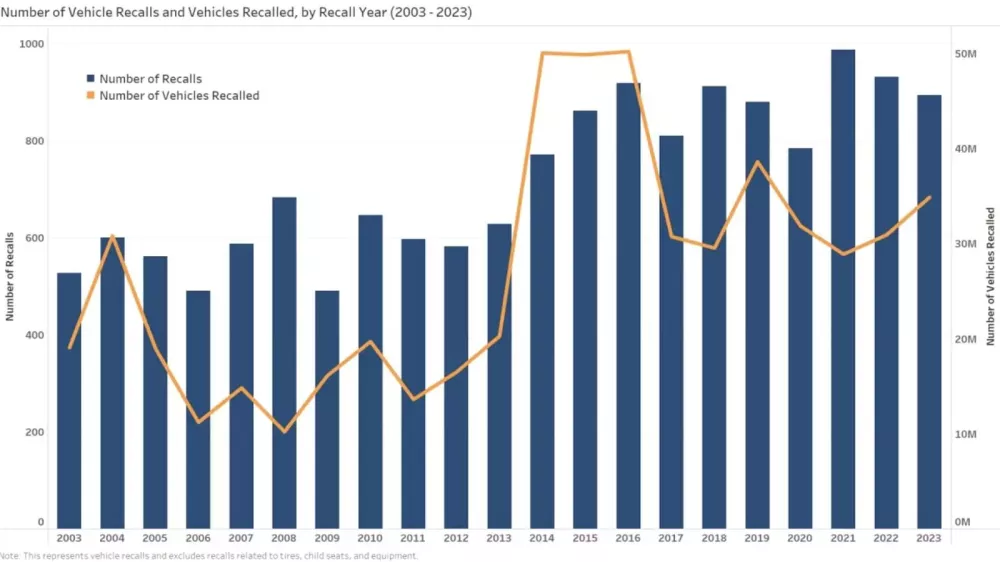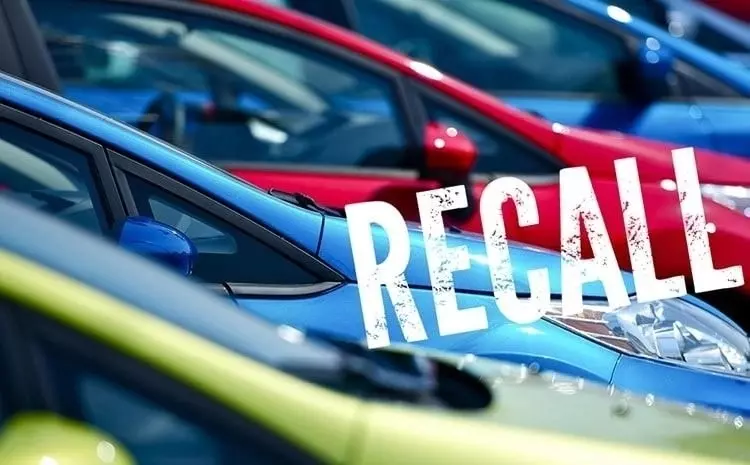Are Rising Vehicle Recalls a Cause for Concern?
The short answer is yes. Reports from the National Highway Traffic Safety Administration (NHTSA) show that from 2003 to 2023, both the number of recalls and the number of vehicles recalled increased. However, 2024 was an exception, with only 445 recalls involving approximately 29 million vehicles, a decrease from the previous year.
In the first half of 2025, automakers recalled more than 10.7 million vehicles, according to BizzyCar’s service management system. While the number of vehicles decreased, the number of recall campaigns increased to 229, mainly due to Ford, which accounted for 88 campaigns (36%) and more than 40% of the total number of vehicles recalled this year.

The chart shows the number of recalls (in blue, left column values) and the number of vehicles recalled (yellow line, right column values) in the US from 2003 to 2023
Why Are Recalls on the Rise?
The reasons are not straightforward. While the US sells approximately 14-17 million new vehicles each year, the complexity of modern vehicles has increased exponentially. Advanced safety systems, intelligent suspension systems, electronically controlled brakes and steering, multi-tier infotainment systems, hybrid powertrains, and more, all contribute to increased technical risks.
In addition, the global supply chain has become increasingly intricate. According to Valicor, an environmental management company, a minor issue with an insignificant component can lead to recalls across multiple continents and brands.
Moreover, consumer expectations have risen. While it was normal for vehicles to occasionally malfunction in the 1980s, consumers in 2025 demand near-perfect performance. This compels automakers to be more accountable and proactive in recalling even minor issues that they might have overlooked in the past.
In parallel, regulatory agencies have tightened their oversight. NHTSA closely monitors consumer complaints, looking for recurring patterns, and pressures automakers to take action.
Why Recalls Can Be a Positive Sign

When it comes to vehicle recalls, infamous scandals often come to mind, such as the Ford Pinto fires, Takata’s deadly airbags, GM’s ignition switch fiasco, or Volkswagen’s emissions cheating. These incidents not only resulted in significant financial losses but also damaged brand reputations.
As a result, automakers today are far more proactive in detecting and addressing technical issues to prevent scandals before they escalate. A prime example is Tesla, which recalled 5.1 million vehicles in 2024, the highest in the US. However, most of these were software-related and resolved through over-the-air updates, without the need for a trip to the garage.
Addressing minor issues early on protects brand reputation and directly benefits consumers. Users get a more refined product, and in the event of a problem, the chances of a quick resolution are high.
But Recalls Can Also Signal Bigger Problems
While recalls may sometimes involve minor software updates, they can also indicate more serious concerns. Take Ford, for instance. In 2023, the company had 54 recall campaigns affecting over 5.6 million vehicles. This number remained high in 2024, with 67 campaigns involving 4.7 million vehicles.
The situation worsened in 2025. As of now, Ford has initiated 94 recall campaigns, potentially impacting 6.35 million vehicles, a new record with five months still left in the year.
The issues are diverse, ranging from electrical problems, backup camera malfunctions, powertrain issues, and more. This dispersion of problems indicates that Ford is grappling with deep-seated quality control issues.
Even Ford’s CEO, Jim Farley, acknowledged this: “I have a lot of regrets, and this is one of them,” he said last year regarding the delay in reforming product development processes. Despite promises to improve quality in 2025, the reality has yet to reflect this commitment.
Massive recalls not only erode customer trust but also incur staggering costs. For instance, Ford’s 90th recall, involving fuel injector issues in the Bronco Sport and Escape models, is estimated to cost over $500 million, according to Reuters.
In contrast, Volkswagen offers a commendable example of turning things around. In 2022, they ranked second in the US for the number of vehicles recalled, with over 1 million vehicles. However, just a year later, this figure plummeted to 332,000 vehicles, dropping them to the 18th spot.
“Volkswagen Group of America has worked diligently to enhance vehicle quality, thereby reducing the likelihood of recalls,” the company stated in 2023. “Technical issues have decreased significantly, warranty rates are at historic lows, and our region’s quality assurance inspection program has yielded positive results.”
Don’t be overly alarmed by recall news. In most cases, it signifies a responsible manufacturer willing to rectify issues before they spiral out of control.












































